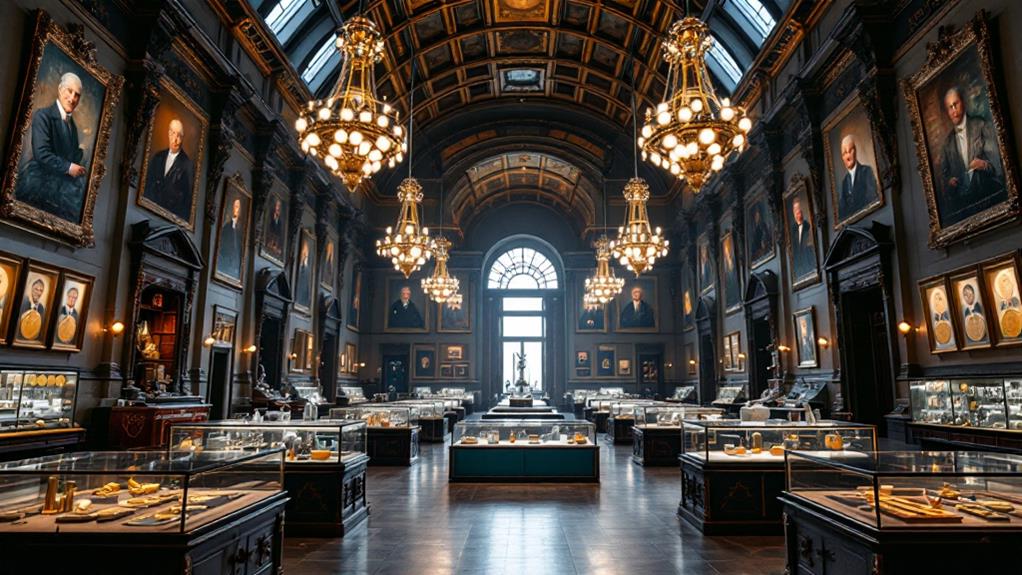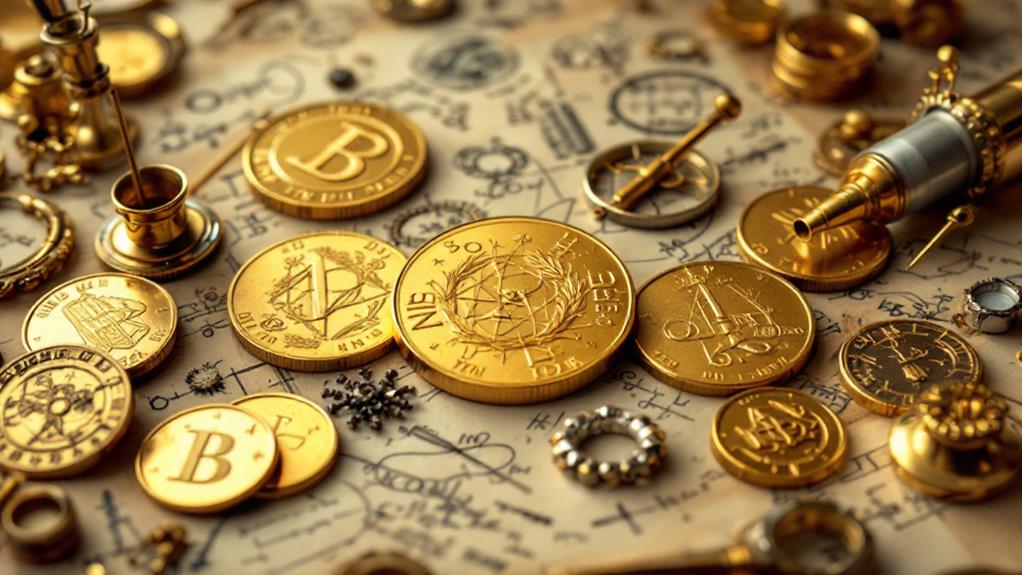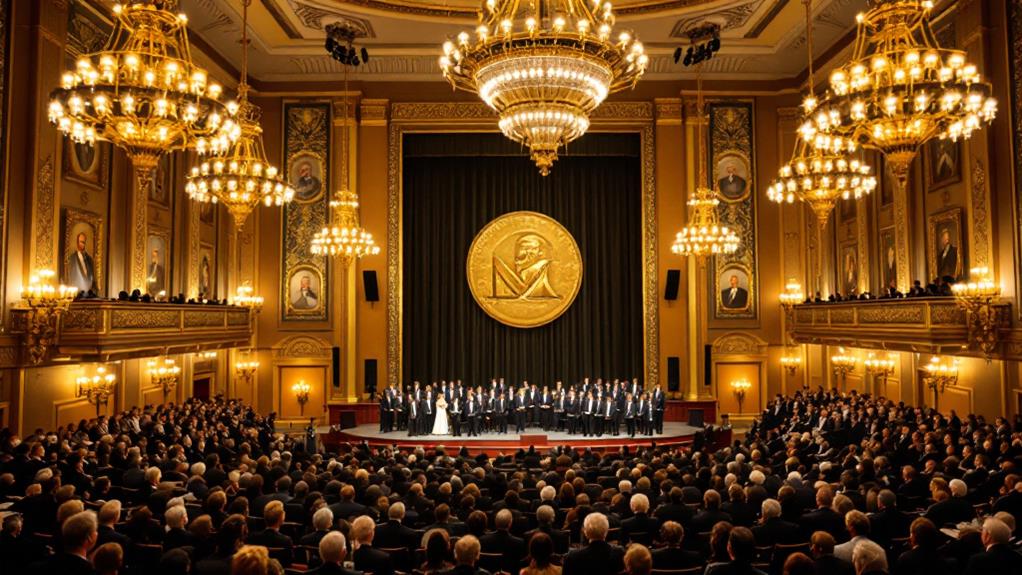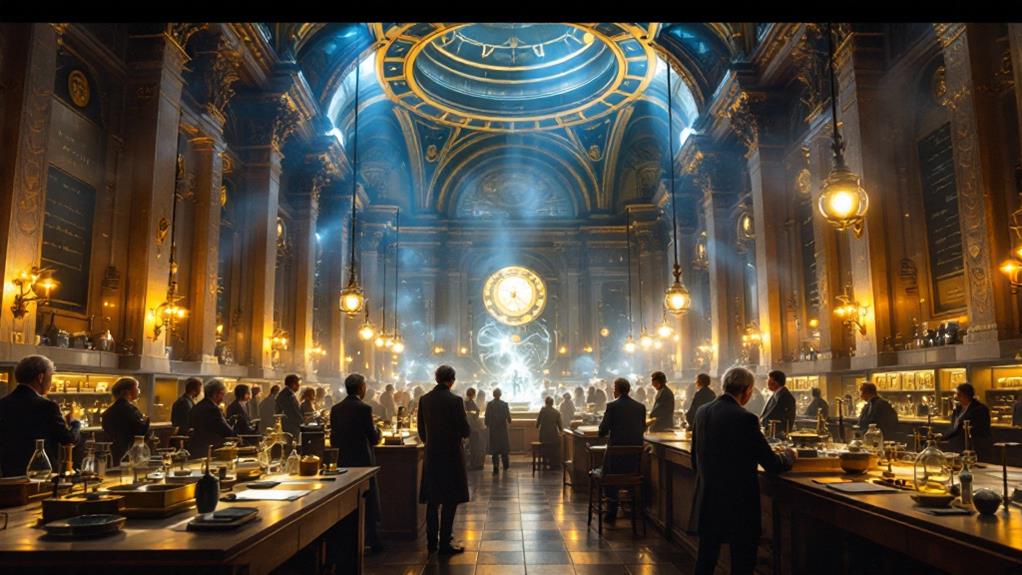The History of the Nobel Prize: Celebrating Scientific Achievement

When you think of the Nobel Prize, you're recognizing Alfred Nobel's legacy of rewarding extraordinary achievement in science and peace. Nobel's vision was to inspire progress and resolve conflicts by honoring excellence. Initiated in 1901, prizes celebrate paths forged in physics, chemistry, medicine, literature, and peace, with economic sciences added later. Notable laureates like Marie Curie and Barbara McClintock have shaped scientific advancement, underlining the prize's influence. Despite occasional controversies, the Nobel Prize continues driving researchers toward groundbreaking revelations. Curious about how this prestigious award fosters collaboration and fuels future innovation? There's a deeper story waiting for you.
The Origins of the Nobel Prize
At the end of the 19th century, the Nobel Prize was born from the mind of Alfred Nobel, a Swedish inventor, engineer, and industrialist. As you investigate its origins, you'll find that Nobel's legacy is deeply rooted in his desire to honor those who contributed greatly to humanity. The initial conception of these prestigious awards reflected his vision to reward groundbreaking achievements in physics, chemistry, medicine, literature, and peace.
You might be interested to know that the Prize evolution started with Nobel's will, which detailed his intent to use his fortune to establish the awards. He allocated the majority of his wealth to fund the Nobel Prizes, ensuring that the most deserving individuals would be recognized annually. As you trace this evolution, you'll see how the awards have grown to encompass more fields and adapt to modern times.
Understanding the origins of the Nobel Prize, you grasp how Nobel's vision laid the foundation for an enduring tradition of celebrating excellence. This legacy continues to inspire countless individuals to pursue innovation and humanitarian efforts, driving progress across the globe and cementing the Nobel Prize as a symbol of ultimate recognition.
Alfred Nobel's Vision
Many might wonder what fueled Alfred Nobel's vision for the prestigious awards that bear his name. Imagine a man known for inventing dynamite, yet deeply concerned about his legacy. Nobel, a Swedish chemist, was motivated by a desire to leave a mark that aligned with his ideals of progress and peace. He envisioned a future where scientific and cultural achievements were celebrated and rewarded, shaping the world positively.
Picture Nobel sitting in his study, drafting the will that would establish the Nobel Prizes, with thoughts swirling about how his legacy could influence generations:
- A world moved by the power of ideas, where breakthroughs in science and culture led to meaningful change.
- A commitment to peace, driven by the belief that knowledge and collaboration can overcome conflict.
- A desire to uplift humanity, celebrating those who push boundaries for the betterment of society.
- A responsibility to future generations, ensuring that the pursuit of excellence continues.
Categories and Criteria

The Nobel Prizes encompass six distinct categories, each reflecting Alfred Nobel's vision for advancing humanity. You might be curious about these prize categories: Peace, Literature, Chemistry, Physics, Physiology or Medicine, and Economic Sciences. Each category is carefully selected to honor breakthroughs that profoundly impact society. Nobel's original will outlined five categories, with Economic Sciences added later in 1968.
When it comes to selection criteria, it's all about recognizing the most outstanding contributions within these fields. You should know that the criteria are rigorous and detailed, guaranteeing only the most deserving individuals or organizations are awarded. The committees responsible for each prize category evaluate nominees based on their originality, significance, and potential long-term impact. They painstakingly review the nominations, often consulting with experts to guarantee their decisions are well-informed and unbiased.
In your exploration of these prestigious awards, it's vital to understand that the Nobel Prizes aren't just about past achievements. They aim to inspire future innovation and exploration. By recognizing extraordinary accomplishments across diverse fields, the Nobel Prizes continue to fuel progress and inspire countless individuals worldwide.
Notable Laureates in Science
Engage yourself in the world of remarkable scientific minds who've been recognized with a Nobel Prize, and you'll encounter pioneers who've reshaped our understanding of the universe. These laureates have left indelible marks on science, inspiring generations with their groundbreaking work. Among them, female laureates have shattered glass ceilings, proving that gender is no barrier to scientific excellence.
Consider Marie Curie, the initial woman to win a Nobel Prize and the only person awarded in two different scientific fields—Physics and Chemistry. Her work on radioactivity was nothing short of revolutionary. Then, there's Dorothy Crowfoot Hodgkin, who revealed the structures of significant biochemical substances through X-ray crystallography, paving the way for modern medicine.
To visualize their impact, picture:
- Marie Curie: Peering through her lab microscope, unearthing the secrets of radioactivity.
- Dorothy Hodgkin: Decoding complex chemical structures, shaping the future of pharmaceuticals.
- Rosalind Franklin: Disclosing the double helix structure of DNA, her groundbreaking work forming the foundation of genetics.
- Barbara McClintock: In a cornfield, revealing the concept of genetic transposition, redefining genetic research.
These scientific breakthroughs not only earned them Nobel recognition but also expanded the horizons of human knowledge.
The Nobel Prize Ceremony

As you ponder the achievements of Nobel laureates in science, imagine the moment when these brilliant minds gather to receive their accolades. The Nobel Prize Ceremony, held annually on December 10th, is a prestigious event steeped in ceremony traditions. Picture yourself in Stockholm, where the ceremony unfolds with elegance and grandeur at the Stockholm Concert Hall. It's a celebration of human ingenuity and perseverance.
You'll witness the award presentations, where the laureates, dressed in formal attire, receive their medals and diplomas from the King of Sweden. Each presentation is accompanied by citations summarizing the laureates' groundbreaking contributions. The atmosphere buzzes with anticipation and admiration as each name is called. You can feel the weight of history and the promise of future revelations in the air.
After the formal ceremony, the Nobel Banquet takes place in the Blue Hall of Stockholm City Hall, offering a chance for laureates, royalty, and guests to mingle and celebrate. This event is rich in tradition, featuring speeches, toasts, and a sumptuous dinner. The Nobel Prize Ceremony not only honors individual achievements but also reinforces the value of scientific exploration and collaboration.
Controversies and Criticisms
Nobel Prizes, while celebrated for recognizing monumental achievements, haven't escaped controversy and criticism. You might not know it, but beneath the glittering surface, issues like gender bias and political influence have cast shadows over the awards. Despite intentions to honor the best, the Nobel committees have faced accusations of inconsistency and a lack of transparency. These criticisms aren't just whispers; they resonate through diverse examples:
- Gender Bias: Women have historically been underrepresented among laureates, sparking debates about fairness.
- Political Influence: Some prizes have been criticized for being swayed by political agendas rather than pure scientific merit.
- Overlooked Contributions: Key contributors to groundbreaking revelations sometimes find themselves without recognition, leading to questions about the selection criteria.
- Prize Monetization: The financial aspect of the Nobel Prize can overshadow the intended focus on scientific advancement.
You've probably noticed that these criticisms highlight significant challenges in maintaining the prize's integrity. Award inconsistencies and transparency issues further complicate the situation, making it difficult to see the true merit behind some selections. As you probe deeper, you'll find that these controversies invite a broader discussion about the responsibility of prestigious awards to evolve and address these enduring concerns.
The Prize's Impact on Science

Few awards have left as profound an impact on the scientific community as the Nobel Prize. When you think about its influence, consider how it encourages scientific collaboration. By recognizing groundbreaking work, the prize fosters an environment where researchers from diverse fields come together, sharing ideas and expertise. This cross-pollination of knowledge often leads to breakthroughs that might not have been possible in isolation. Nobel laureates frequently collaborate with other scientists, which can spark further innovation and revelation.
In addition to promoting collaboration, the Nobel Prize opens doors to funding opportunities. Once a scientist receives this prestigious award, their work gains significant attention from both public and private sectors. You're more likely to see increased investment in their research, enabling them to push boundaries and examine new frontiers. This influx of funding not only benefits the laureates but also supports their teams and institutions, driving progress in their respective fields.
Moreover, the Nobel Prize inspires future generations of scientists. When you see someone receive this honor, you're reminded of the potential impact your work can have on the world. It encourages aspiring researchers to pursue their passions, knowing that their contributions might someday be celebrated globally.



